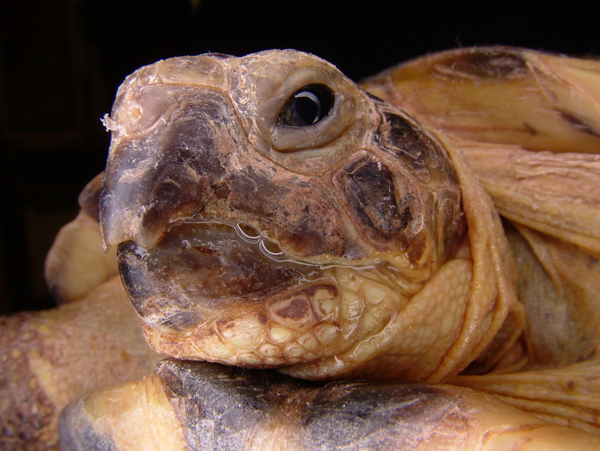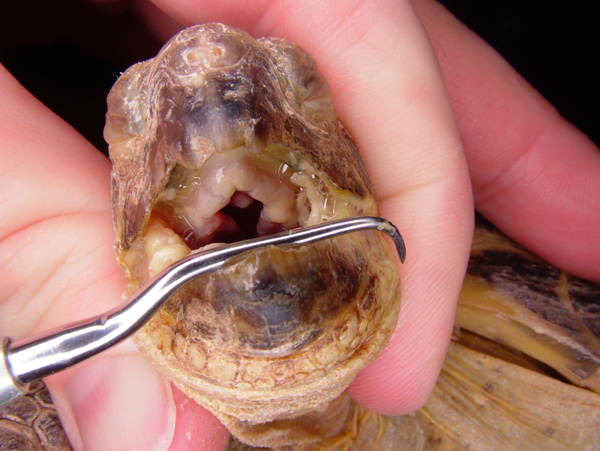Causes Herpesvirus. There are many different kinds of herpesvirus and not all of them cause overt signs of illness. Species At-Risk Testudo s
Causes
Herpesvirus. There are many different kinds of herpesvirus and not all of them cause overt signs of illness.
Species At-Risk
Testudo species, particularly Russian tortoises, are most commonly seen with oral plaques due to herpesvirus and may rapidly die from viral hepatitis. Desert tortoises have their own unique herpesvirus. It is likely that each species of tortoise has a herpesvirus that may cause illness when it goes to a different species. This is one reason why it is unwise to mix different species of chelonians together. Different kinds of herpesvirus have been recovered from many other reptiles.

KEVIN WRIGHT, DVM, DABVP (RA)
Notice the drooling in this tortoise. It is a condition of the Herpes virus.
Symptoms/signs
Herpesvirus causes lesions on the lining of the mouth, tongue and choana (the opening on the inside roof of the mouth allowing the nose to connect with the windpipe). As the infection continues, a thick, off-white to yellow “membrane” will coat the inside of the mouth; this is called a fibrinonecrotic plaque. A sick tortoise is often reluctant to eat or drink, typically has a runny or crusty nose and a drooling or crusty mouth.
You may hear an audible whistle or gurgling noise when the tortoise breathes, and many tortoises open-mouth breathe or gape because they cannot draw air in through the swollen, inflamed tissues lining the nares. Many infected tortoises have closed or swollen eyes, hide and sleep a lot, and are reluctant to move much. In rare cases, herpesvirus has been associated with neurological diseases such as circling and uncoordinated movement. Some tortoises die without the owners being aware that they are sick.
Herpesvirus may go into remission, effectively hiding in the tortoise’s body for months or years before causing a subsequent illness. An outwardly healthy tortoise may still be infected and able to spread herpesvirus to others.
Predisposing Captive Conditions and/or Other Factors
Immunosuppressed tortoises, particularly ones that have been exposed to different species of tortoises or turtles, are most at risk. Stressors that inhibit immune function include removal from the wild and subsequent shipment, crowding, inappropriate temperatures, lack of appropriate light, unsanitary practices, dehydration, poor diet, and exposure to other pathogens such as internal parasites.
Diagnostic Tests a Veterinarian May Recommend
A swab of oral lesions can be submitted for a PCR test to detected herpesvirus DNA. Some research labs may be able to work with a blood sample and give information about the length of time a tortoise has been infected. It may take several days for these tests to be reported.

KEVIN WRIGHT, DVM, DABVP (RA)
Evidence of Fibrinonecrotic plaque caused by the Herpes virus.
Cytology from an oral swab may be examined under a light microscope to detect herpesvirus inclusions in the cells. This is a rapid test that can be done in most veterinary clinics but it only picks up moderate to high levels of infections and may miss early infections.
Bloodwork is important to check liver health since herpesvirus can quickly cause serious liver disease. Radiographs may detect bone resorption suggesting a chronically ill tortoise, and may rule out pneumonia, intestinal impaction, and bladder stones as a cause of illness. Periodic bloodwork may be needed depending on which medications are used; some, like acyclovir, may cause kidney problems if not used properly.
Safe Practices/Prevention
Isolate: To prevent the spread of the disease, isolate the sick tortoise and all tortoises that have had close contact with it.
Quarantine: Given the length of time herpesvirus may lay dormant in a tortoise, a 180 day to one year quarantine is not unreasonable.
Proper hygiene and sanitation: Chlorine bleach (one cup household bleach in 1 gallon water) is a very effective disinfectant for tools, water bowls and cages. Outdoor enclosures with dirt and plants are likely to be contaminated for a year or more; they should not be used to house healthy tortoises. Wear disposable gloves or wash your hands with warm water and soap after handling or working with an infected tortoise. Do not wear the same shoes when servicing an infected enclosure as when you work in the pens of healthy tortoises.
Treatments a Veterinarian Would Likely Recommend
The mouth may need cleaning to remove pus and debris. The choana may need to be flushed every 48 to 72 hr to unclog the nostrils and reduce inflammation.
Acyclovir, an antiviral medication, may be prescribed. This is given orally, often by a stomach tube or a surgically-placed feeding tube, and is important to combat the herpevirus’s infection of internal organs such as the liver. A cream form of this medication may be applied to lesions in the mouth to help speed healing. Antibiotics may be needed to manage bacterial infections that spread from sores in the mouth and upper airways.
Tube-feeding and hydration using injectable fluids may be needed. Some tortoises need to have a feeding tube surgically implanted so that they can more easily receive oral medication and liquid diets. Pain relievers may be prescribed.
Extremely ill tortoises may need hospitalization for several days until they are stable enough for home care.
Prognosis
Tortoises that have minor oral ulcers, stopped feeding within the past few days, and are otherwise alert and active generally recover with treatment. Tortoises that have been ill for more than a week, particularly if they are not eating or drinking, have a guarded outlook.
Other tortoises should be watched for signed of herpesvirus. They may also be carriers of the herpesvirus so bloodwork to check for signs of infection is recommended.
Zoonotic Potential
None



